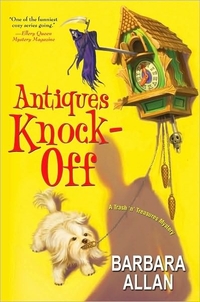 RAGE |
 Fall headfirst into July’s hottest stories—danger, desire, and happily-ever-afters await. |

Purchase
Trash 'n' treasures #5 Mystery Amateur Sleuth Excerpt of Antiques Knock-Off by Barbara AllanKnock-down If you are in a bookstore, reading this opening paragraph, trying to decide whether or not to shell out your hard-earned money, you should know that I, Brandy Borne—thirty-one, bottle blonde, divorced, who came running home last year to live with her bipolar mother— am not perfect. I make my share of mistakes. Repeatedly. I am not always what you might call “nice.” Nobody’s role model. (Also, there will be parenthetical remarks. I’ve been told the mark of a really bad writer is the overuse of parenthetical remarks. But you wouldn’t know that, if I hadn’t made a parenthetical remark just now.) Therefore, I will understand if you replace this book on the shelf. One favor, please, if you don’t make a purchase? Could you face the cover out? And, perhaps (if no clerks are lurking to catch you at it), move the book to a more prominent spot? Thank you. So much has happened in the fourteen months since I’ve been back in Serenity, a small Midwestern town nestled on a bend of the mighty Mississippi, that I hardly know where to begin. Actually, I began four books ago, but don’t panic—I can catch you up quickly, and those of you who have been with Mother and me from the beginning (God bless you, and no sneeze required) might appreciate a refresher. Besides the several murder mysteries in which Mother and I got ourselves involved (Mother a willing participant, me not so), I had also received two disturbing anonymous letters. The first claimed that my much-older sister, Peggy Sue— who lives in a tonier part of town—was my birth mother; the other missive insisted that my biological father was none other than a certain United States senator. After confronting Sis about these obnoxious notes, she confirmed that their contents were accurate, which put an added strain on our already strained relationship. But we both came to the conclusion that, for the present, we would keep these revelations to ourselves, and not disturb the status quo. Sis was to remain Sis, and Mother Mother . . . which suited social-climbing Peggy Sue just fine. Me, I had my own reasons for keeping quiet, chief among them not disturbing an already plenty disturbed Mother, who had stopped taking her bipolar medication a few months ago. We now return you to the regularly scheduled mystery novel (and there will be another mystery, and another murder, despite my best efforts otherwise). . . . Summer had once again arrived in Serenity, though it seemed something of a surprise after endless snow and then continual rain that had caused a flood from which our little community was still recovering. These were what we Midwesterners call the dog days: hot and humid, a literal pressure cooker—well, not a literal pressure cooker, but more than just a figurative one. And while those with money fled north to Minnesota and Canada until the weather cooled off, we common folk holed up in air-conditioned houses, or malls, or movie the aters, venturing out only in the early-morning hours, or late evening, when the heat was barely tolerable. At the moment, I was indoors, specifically upstairs in my bedroom, trying to find something to wear that was cool, and cool. Because being seven months pregnant during the summer was no picnic. Oh! Didn’t I mention that I was expecting? Sorry. Okay, just a little more catching up. . . . My best friend, Tina, couldn’t have a baby with her husband, Kevin (because she’d had cervical cancer), so I volunteered to be a surrogate mother for them. (Sometimes I am nice.) But don’t worry—I’m not going to be all, “Ooooh, my back hurts,” and “I gotta pee again,” for three hundred pages. Nor will you have to encounter such verbs as “trundled,” or “waddled.” You’ll hardly even know I’m preggers. Just, when you picture me—shoulderlength blond hair, blue-eyed, kinda pretty—don’t forget to add a baby bump. From my closet I selected an outfit Tina bought for me—a Juicy Couture yellow sundress (from their maternity line) and a pair of orange Havaianas (flip-flops that I’d always wanted but wouldn’t buy myself because I couldn’t pronounce them). You see, I figure if you dress right, people won’t think “trundle” or “waddle” when you pass them on the street. Sushi, my brown-and-white, blind, diabetic shih tzu (actually, my only shih tzu, and the only thing besides clothes that I slunk home with after the divorce) (Jake, twelve, was staying with his father in Chicago) (I warned you about the parentheticals) was on the floor a few feet away, attacking an old brown Brighton snakeskin belt as if it were a real reptile. I used the thing to keep her busy while I got dressed, otherwise she’d drag out all my shoes from the closet. I would hide the belt in the bedroom for her to find—which she’d sniff out in a nano-second, even though she couldn’t see it, having slobbered on the thing so much. After checking myself out in the large round mirror of my Art Deco dressing table, feeling a pregnant woman of thirty-one had no right to look so cute, I scooped Sushi up and headed downstairs to find Mother. This morning, we were taking in an antique mantel clock to be fixed; it was lovely but not keeping time. We had snagged the clock at a tag sale because the seller (an out-of-state relative of the deceased) didn’t know its regional value and, naturally, we kept mum, as is the prerogative of any dealer (first rule of collecting). Mother and I had a booth at the downtown antiques mall—located in a four-story Victorian brick building— and we figured that once the clock had been cleaned and repaired, we could sell it for five times what we paid. Mother would take the lion’s share (or lioness’s share) because she had spotted it first. Our acquisition was one of only a few thousand such clocks made right here in Serenity from about 1890 to 1920 by the celebrated Andre Acklin, who had emigrated from Switzerland to take advantage of the top quality wood from our lumber mills (for clock casings), and pearl from the Mississippi mussel shells (clock faces). As a young man, Acklin had worked in France with Jules Audemars and Edward Piguet—future founders of Audemars Piguet Watch Company—but Acklin went his own way when the other two men began to concentrate on expensive pocket watches. Acklin preferred creating larger timepieces over working in miniature, and also wanted to use more natural materials. Sadly, Serenity’s famed clockmaker died one bitter winter afternoon in 1920, when a fire broke out in his shop on Main Street, blotting out the cold temporarily and the clockmaker permanently. According to local legend, some of his precious inventory did survive. So, naturally, when Mother and I saw an opportunity to buy an Andre Acklin mantel clock for a song at the tag sale, we were nearly beside ourselves with excitement—although we did our best not to show it (second rule of collecting). In the kitchen, I found Mother in all her manic glory, standing at the sink, feverishly polishing a vintage silver tea set that we never used. At least her energy, as of late, had been directed toward home improvement, not investigating some murder—real or imagined. Mother—age unknown because she’d forged so many documents, but who had claimed to be seventy-four for the past three years—was a statuesque Dane, with porcelain skin nearly free of old age spots, wide mouth, narrow nose, prominent cheekbones, and pale blue eyes magnified to twice their size behind large round glasses. She wore her shoulder-length silver-white hair in a variety of buns on a variety of places on her head, even when she went to bed. Today Mother graced us in a pale yellow blouse and matching capris—one of several new outfits I’d gotten her because she’d lost so much weight during her manic phase, when she slept little and ate even less. Now, some of you may be asking why I didn’t just talk to her about going back on the medication. I did talk. She wouldn’t listen. Why did she refuse to listen to reason? Because, at the age of seventy-whatever, the manic phase makes her feel like Superwoman! She’s on a high that can last for months. But then comes the inevitable depression stage (laced with paranoia) and, inevitably—like a jet going three hundred miles an hour at thirty-six-thousand feet—she runs out of gas and nose-dives to Earth. I just prayed the crash wouldn’t happen until after the baby was born. (I’m not proud of this, but I tried crushing one of her pills and hiding it in her favorite pastry—a vanilla cream- horn—but she caught on with one bite, and threw the rest of the pastry—and her medicine—away.) (This technique doesn’t work on Sushi, either.) “If you don’t stop doing that,” I said, “you’ll polish the silver right off.” Mother held the teapot out by its ornate handle, saying proudly, “Look, dear, I can see my face in it!” So could I, a funhouse reflection with giant bug eyes, and I could only wonder if it was how she viewed the world at the moment—recognizable, if distorted. “Mother,” I said, “we should hurry—before it gets too hot out.” “Oh, yes, dear,” she said with a pensive frown. “The clock.” She set the teapot down and began wiping her hands with a dishtowel. “You’ve packed it well?” I nodded. “What about Sushi? Do you think the little doggie would like to go with us?” “Moth-er,” I groaned. Groaned, because at the mention of her name, Sushi would no doubt come running, and did. That and the word “go” had her dancing at our feet. “Oh, I am sorry,” Mother said. “The little devil knows the word ‘go,’ doesn’t she? I should have spelled ‘go,’ instead of said ‘go.’ ” “Will you please stop saying ‘go’?” Sushi was in a frenzy now, yapping ever louder. Mother put hands on hips. “Now you just said, ‘go.’ ” “There you go again!” We glared at each other in what was an all-too-common occurrence around the Borne homestead: a stalemate of idiocy. I sighed. “Well, now, she’ll have to go with us.” “I guess she will,” Mother huffed, “because you keep saying ‘go.’ ” I left (not trundled!) to get the dog carrier in the front closet, Sushi underfoot, almost making me trip. Normally, I enjoyed taking Soosh out with me on short errands, but this time we were going to a new place—Timmons Clock Repair—and I didn’t know if there would be another dog on the premises, or how long we would stay . . . and, besides, we were toting along a valuable antique. But now, if we didn’t take Sushi, the little furball would surely exact her revenge, and that could mean (but would necessarily not be limited to) any of the following: peeing on the Oriental rug, chewing the leg / arm of a Queen Anne chair, tearing up a feather pillow, unrolling the toilet paper. Barricading the blind barker in the kitchen never worked—the one and only time we did that, she chewed off all the corners of the lower cabinets. I did own a rhinestone-studded dog-carrying bag, but the pink balboa feathers made Sushi sneeze, so I’d replaced the bag with a baby front-pack (pink, pictured with rattles and pacifiers and diaper pins), which was better because it freed up my hands. I had just strapped the front-pack on and was preparing to deal with the dog, when the doorbell rang. Our post- woman—short brown hair, no make-up, athletic build— handed me the mail and, after exchanging a few words with her about how hot it was, I closed the door, then put the correspondence on a nearby Victorian marble-top table reserved for such things as car keys, loose change, sunglasses, cell phones, and grocery lists. I’d been waiting for a rebate check on my new phone— which I intended on blowing on the end-of-summer shoe sales, because shoes would still fit after the baby came—so I took the time to sift through the mail. Electric bill, water bill, church bulletin, You-Could Win- a-Million-Dollars! notice, letter with no return address, phone bill, fashion magazine . . . . . . letter with no return address! I snatched up the familiar white envelope with distinctive computer font, but was surprised this time to see it addressed to ...Vivian Borne. Mother. And she was right there, instantly suspicious. “What is that you have there, dear?” I whirled, hiding the anonymous letter behind my back. “Nothing. Just more junk mail.” And I laughed a little, in that unconvincing way the guilty do in movies. Mother’s eyes narrowed, her voice taking on a strange, dubious tone. “If it’s nothing, dear, why conceal it?” I was in a kerfuffle—should I lie about the letter, and increase her paranoia? Or give it to her, knowing its contents might well send her on a downward spiral? Not the best of options. . . . I handed the letter over, with a “You’re not going to like it” look. She ignored that, and strode over to her favorite Queen Anne needlepoint armchair, and sat regally, while I crossed the Oriental rug to the matching needlepoint sofa, settling as comfortably as I could on the rigid furniture. I watched with increasing anxiety as Mother opened the envelope, unfolded the single-sheet contents, then brought it up closer to her glasses. Sushi, sensing a postponement in our trip, found a stream of sunlight to swim in, placing her head on her crossed front paws, her lower lip protruding poutily. I could pretty much guess what the letter said, going by the two I’d already received. But as Mother slowly read it aloud, I clearly had underestimated the depth and scope of viciousness intended by its sender. “‘Soon all will know that Brandy is not your daughter,’” Mother said, then paused, realizing what had just come out of her. Then she resumed, in an atypically hushed voice. “‘. . . and that Peggy Sue is her real mother. And Senator Clark can kiss his political career good-bye.’” Mother’s hand containing the letter dropped to her lap, her face turning ashen; then a bright red burn began at her neck, working its way up. She turned to me, eyes blazing. “You knew?” I nodded. “How long have you known?” I shrugged, as if I were the one who’d wrongly withheld a secret. “A few months. First one I got was about Peggy Sue. Second one was about Senator Clark.” “And Peggy Sue? She knows that . . . you know?” I nodded again. “She got her own nice anonymous notes.” Mother stood, pointing at me, j’accuse. “And you kept this from me? How could you do such a thing?” “Hey! You kept it from me for thirty years! So don’t get up on your high horse.” Mother stared for a long moment, then nodded. Her manner was disturbingly calm. “Point well taken, my dear. You have a perfect right to be miffed.” “Miffed?” “But you must understand . . . we did what we thought was best.” “Best for whom, Mother? You and Peggy Sue, you mean?” Mother came to join me on the couch, putting one hand on my knee. “No, Brandy . . . best for you. Peggy Sue couldn’t have cared for a baby properly—she was only eighteen, and unmarried—times were so different back then. And since the man you thought of as your father— my husband, Jonathan Borne—had just died, you gave me great comfort.” Her eyes seemed about to overflow. “Did . . . did I do such a bad job, dear?” Excerpt from Antiques Knock-Off by Barbara Allan |
|
| |||
|
||||



 © 2003-2025
© 2003-2025